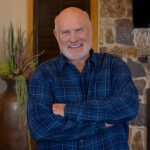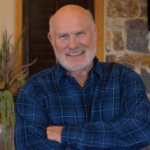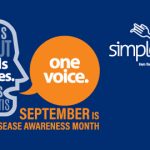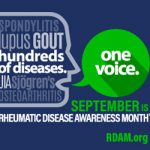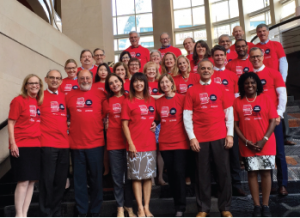
ACR volunteer leaders kick off RDAM 2017.
Wider awareness and understanding of the more than 100 different rheumatic diseases is a vital element in our work as rheumatologists and rheumatology health professionals. Stimulating interest and engagement among lawmakers, patient groups and the public at large is essential to successful advocacy efforts, as well as the overall future of our specialty.
This September, the ACR and our Simple Tasks public awareness campaign will kick off the second-annual Rheumatic Disease Awareness Month. The continuing RDAM theme is Hundreds of Diseases. One Voice. To further amplify how truly far reaching rheumatic diseases are, we’ve also included a secondary theme that ties into this year’s celebrity spokesman: You don’t have to be an athlete to have sore joints.
Touchdown Pass for Arthritis
We are thrilled to have the involvement of one of the greatest stars in NFL history, Hall of Famer and former Pittsburgh Steelers Quarterback Terry Bradshaw, in RDAM 2017. Known to millions of fans, not just from his playing days when he won four Super Bowl victories with the Steelers but for decades as a broadcaster, Mr. Bradshaw also has rheumatoid arthritis.
Did you know that? Probably not, and that is why his involvement will be so meaningful to this year’s campaign. Many patients, such as Mr. Bradshaw, are living with a rheumatic disease without most people around them knowing that they have it. One of the most important goals of this campaign is to let the public know more about how rheumatic diseases affect people in their everyday lives and work, and cause debilitating symptoms that other people may not see.
Mr. Bradshaw adds a personal touch to our message in a series of public service announcements about rheumatic diseases, which will be aired nationally—including some prime TV spots during the 2017 NFL pre- and regular season—and distributed online via social media. He will be talking about the connections between joint injuries and arthritis, and why it is so important for people to seek care from a rheumatologist as early as possible.
You Can Make a Difference
Naturally, we will be promoting RDAM through the ACR’s public relations outreach to the media and to partners, and online through social media. You too can get involved. We are calling on all ACR/ARHP members to participate and help the ACR drive more awareness of rheumatic diseases in your local communities and media outlets. To make it easy for you, ACR staff has created a number of digital resources, which you can find at RDAM. You can download the new online toolkit, including everything you need to join the conversation. You will find print-ready patient flyers and fact sheets, along with easy-to-customize promotional content/templates for social media posts, letters to the editor, newspaper or newsletter articles, e-blasts, blog posts and proclamations.
We strongly encourage you and your staff to do what you can to promote the 2017 Rheumatic Disease Awareness Month with these resources. Brand new this year is the Joint IQ quiz—an online contest testing one’s knowledge of rheumatic diseases. Adding to the buzz around the quiz is the chance to win a jersey signed by Mr. Bradshaw. We will be promoting the quiz online, as well as at Hartsfield Jackson International Airport in Atlanta.
We Must Drive Awareness
Too many people in our communities simply do not know much about rheumatic diseases. They are unaware that rheumatoid arthritis, osteoarthritis, lupus, gout, psoriatic arthritis, Lyme disease, spondyloarthritis, myositis, vasculitis or other lesser known rheumatic diseases all have something in common and that these diseases affect many different people in all age and ethnic groups. They may not realize that rheumatologists and rheumatology health professionals diagnose, treat and manage all of these diseases.
Together, let us speak with one voice and cut through the confusion. We can improve clarity and increase visibility of rheumatic diseases to drive more effective advocacy, encourage patients to seek diagnosis and treatment earlier, and foster stronger partnerships with stakeholder groups, such as patients, physicians, health advocacy organizations, government and legislators, media and professional associations.
Too many people in our communities … are unaware that rheumatoid arthritis, osteoarthritis, lupus, gout, psoriatic arthritis, Lyme disease, spondyloarthritis, myositis,vasculitis or other lesser known rheumatic diseases all have something in common & that these diseases affect many different people in all age & ethnic groups.
We Need Your Voice
We need you, your patients and your staff members to participate and actively support this campaign. So this September, download and use the resources in the online toolkit. Here are a few easy ways to help drive more awareness of rheumatic diseases in your community:
- Play Terry Bradshaw’s public service announcement in your practice’s waiting room. We will post a link to the PSA on YouTube, or you can email [email protected] for assistance.
- Promote the Joint IQ quiz to your patients and their families by sharing this information in your clinic’s waiting room.
- Print out the #RDAM handouts in the toolkit and give them to your patients and their family members.
- Download and share our suggested social media posts on your Facebook page, Twitter feed, Instagram or other social media platform to raise awareness online.
- Include the 2017 RDAM information in your patient newsletters. You will see a sample template in the toolkit.
- Put the Hundreds of Diseases. One Voice. website badge on your practice or institution website with a hyperlink to the campaign landing page on RDAM.
Let’s tackle rheumatic diseases together. Visit RDAM.org for more details. You will see how easy we have made it to get involved with Rheumatic Disease Awareness Month this year and have a truly positive impact on awareness in your community. Join Terry Bradshaw, your peers, patients, friends at the ACR and me in making 2017 RDAM a huge success.
 Sharad Lakhanpal, MBBS, MD, is in private practice at Rheumatology Associates and a clinical professor of internal medicine at the University of Texas Southwestern Medical School, both in Dallas, where he has lived and worked since 1986. He is also the 80th president of the ACR (2016–17).
Sharad Lakhanpal, MBBS, MD, is in private practice at Rheumatology Associates and a clinical professor of internal medicine at the University of Texas Southwestern Medical School, both in Dallas, where he has lived and worked since 1986. He is also the 80th president of the ACR (2016–17).
